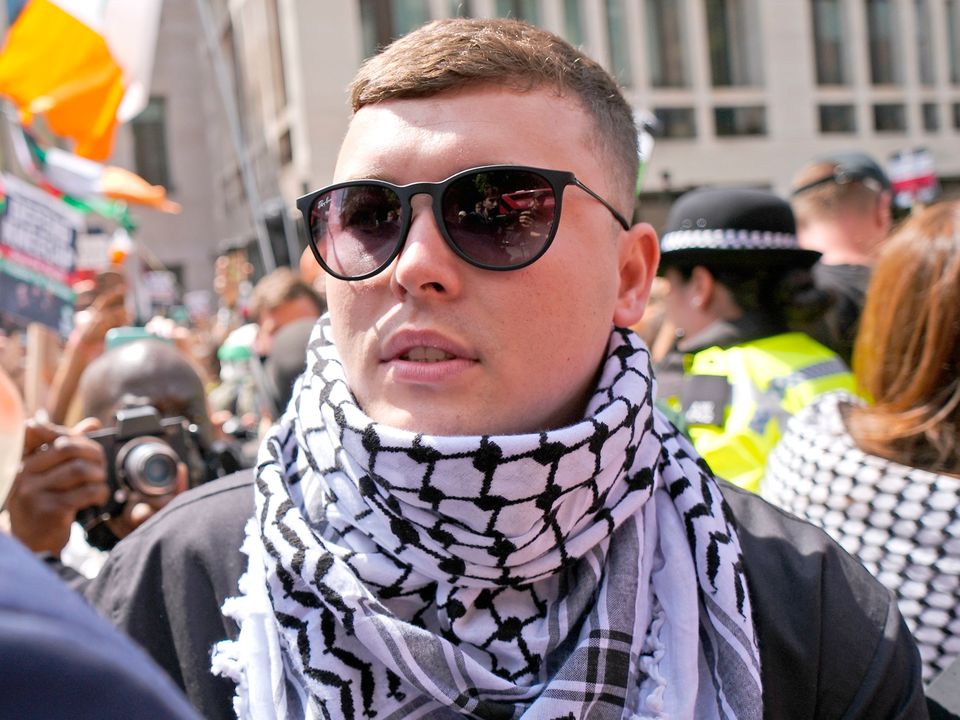The issue was raised when the Belfast rapper, accused of displaying a flag in support of proscribed organisation Hezbollah at a London gig, appeared at Westminster Magistrate’s Court in June. The presiding magistrate said the court couldn’t find an Irish language translator, which led to laughter in the courtroom as bandmate DJ Próvaí acts as an interpreter in the band’s Bafta-winning semi-autobiographical movie. Mo Chara (27) – real name Liam Ó hAnnaidh – has indicated he’ll ask for a translator at his next court appearance, and Committee on the Administration of Justice (CAJ) director Daniel Holder says it could make legal history. Kneecap Irish is recognised in UK law as a minority language, and the rapper could argue he wants to use Irish as his right to freedom of expression without discrimination. “If you have a case where someone is charged with a criminal offence and they do not understand English it is part of their right to a fair trial that they have an interpreter,” says Daniel. Clearly “Now that is clearly not the circumstance here because Mo Chara does speak and understand English. “However, the question would arise, as this is an Irish-speaking artist who does all his stuff through Irish which is probably the home language, there is a fairly strong argument that in order for Mo Chara as a defendant to have freedom of expression without discrimination on the basis of language that he should be allowed to address the court in Irish. “The issue is whether the court will permit that or not. That’s what I don’t think has been decided yet.” In Wales, cases can be heard in Welsh and in UK courts its commonplace for defendants to be provided with an interpreter if they don’t speak English. But Mo Chara’s case could be the first time an Irish language interpreter has been allowed by a court. Daniel Holder “It would be very significant. Certainly I’ve never heard of another case whereby Irish is allowed to be spoken through an interpreter,” says Daniel. “In terms of an English court I’m not aware of any other case where this has happened.” The human rights expert says appointing an interpreter could also make the court appearance less stressful for the Belfast performer. “I know these are very high-profile artists but appearing in court is quite an emotive, highly-charged situation in all circumstances so speaking in your indigenous language that you’re most comfortable in is something the court would hopefully consider and through an interpreter would ensure that everyone understood what was going on.” He says the translation service in courts is formalised and professional. “If it was an interpreter it couldn’t be someone’s mate. “In London there are bound to be qualified Irish language interpreters. They just won’t be used to doing court work as the situation probably doesn’t arise very often,” says Daniel. In Northern Ireland the use of Irish in courts and in court documents was banned under a 1737 law. The Language and Identity Act, brought in by Westminster in 2022, makes statutory provision to repeal the ban, but this has not yet been triggered. In a CAJ-backed tribunal last year, members of Conradh na Gaeilge and several witnesses introduced themselves to the hearing in Irish, the first time it had been spoken in a courtroom since Northern Ireland was founded. “Obviously, there will have been occasions in the past where people have said things in Irish in court without being granted permission to do so, but on this occasion a member of Conradh na Gaeilge was the first person since the establishment of Northern Ireland to address the court in Irish, and for the first time possibly since the ban,” says Daniel. And if Mo Chara chooses to use an interpreter it will not influence his case. “There is no prejudice to the court in doing it. Other than the short additional time it takes to do interpreting, which is routine in cases where someone doesn’t speak English. “It remains to be seen whether the court will permit it or not,” he says. Mo Chara, who was accompanied to court by band members Naoise Ó Cairealláin and JJ Ó Dochartaigh, has been released on unconditional bail. His next court hearing is on August 20. News in 90 Seconds – Monday July 14th
Liam Ó hAnnaidh: Kneecap rapper Mo Chara can make history at London court hearing | #rapper | #hiphop | #hacker | #court |


